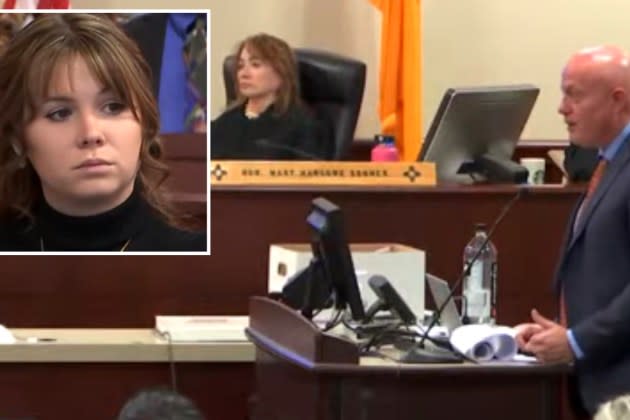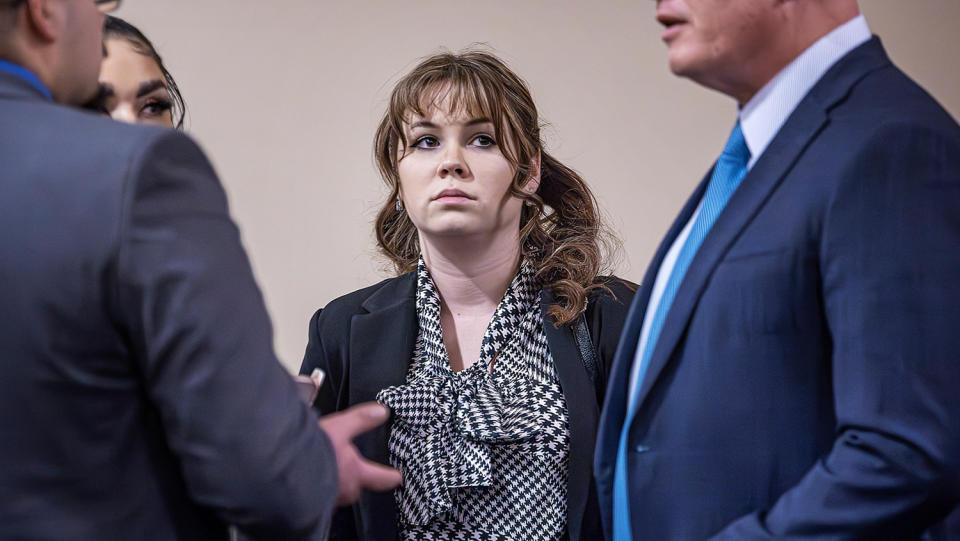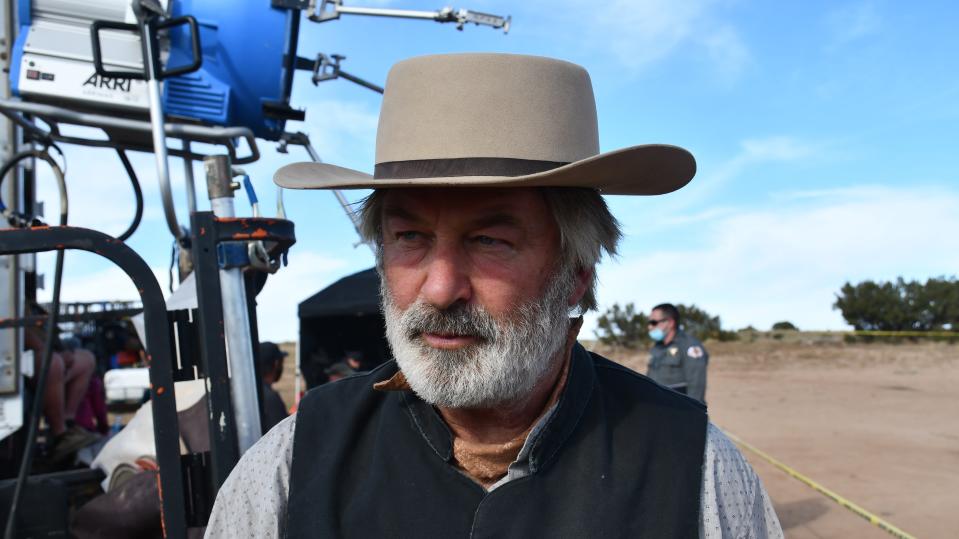‘Rust’ Armorer Hannah Gutierrez-Reed’s Involuntary Manslaughter Trial Goes To Jury After Closing Arguments: “Negligent” & “Careless” Vs. “Convenient Scapegoat” – Update

UPDATED, 12:18 PM: “Justice for Halyna does not mean injustice for Hannah,” defense lawyer Jason Bowles told the jury Wednesday in Rust armorer Hannah Gutierrez-Reed’s involuntary manslaughter trial for the killing of cinematographer Halyna Hutchins on October 21, 2021.
Now that both the defense and prosecution closing statements have concluded, the case has just gone to the jury for deliberations. Read more about the prosecutors’ summary below.
More from Deadline
“It’s extremely important the government rule out every reasonable doubt because that is our standard in this country,” Albuquerque attorney Bowles told the Santa Fe courtroom in his closing argument. “Hannah is a scapegoat for all the management failures.”
Looking to poke holes in the prosecution’s case, Bowles added: “There’s reasonable doubt she had anything to do ultimately with Halyana Hutchins’ death. In this country we can’t decide and convict people on guesses. … it’s not sufficient.”
Charged with involuntary manslaughter and evidence tampering, Gutierrez-Reed faces up to three years in state prison if found guilty. The prosecution has claimed that the armorer was responsible for live rounds getting on the Rust set at Bonanza Creek Ranch. The defense has offered a number of theories on how those fatal rounds got there, including sabotage.
“They rushed to judgment on Ms. Gutierrez-Reed,” the attorney added as his client sat nearby watching Bowles intently. They want to lay the complete blame on her,” Bowles said of prosecutors, Alec Baldwin and other Rust producers, calling Gutierrez-Reed a “convenient scapegoat.”
“The government has to resolve all the reasonable doubt … or we cannot convict,” he added.
“OSHA didn’t buy it, OSHA said it was the higher-ups,” Bowles noted of the findings and fine on Rust producers by New Mexico’s Occupational Health and Safety Bureau in the aftermath of the tragedy, which the organization called “an accident, not as homicide.”
The lawyer’s entire presentation today was delivered in measured tones to the jury of seven women and five men in Judge Mary Marlowe Sommer’s Santa Fe courtroom.
Baldwin was constantly “going off-script,” Bowles said of indie Western star/producer and the legal notion of foreseeability for his client. “The buck stops with production. … As in any organization, it starts at the top.”
After Bowles concluded his hourlong remarks, special prosecutor Kerri Morrissey responded by exclaiming Hannah Gutierrez-Reed “is not a scapegoat … not being treated as a scapegoat.”
“You have everything you need to convict her,” the curt and clearly irritated prosecutor told the jurors. “Her acts caused the death of Halyna Hutchins,” Morrissey later said.
In her response to Bowles’ closing argument, Morrissey refuted the argument that Baldwin going off script frequently and firing guns after cut was called on the troubled set was unforeseeable. Gutierrez-Reed “knew Baldwin was loose,” the prosecutor said, calling the actor a significant cause of the death of Halyna Hutchins.”
“It is her job to say to an A-List actor, if that’s what you want to call him, ‘Hey, you can’t behave that way with those firearms,’” Morrissey then added, in a very naïve notion of how movie sets work in reality.
In both her own closing argument and in her response, Morrissey made a point of telling the court that she was behind the recent indictment and recharging of Baldwin. The multi-Emmy winning actor’s own involuntary manslaughter trial is set to start on July 9.
PREVIOUSLY, 10:42 AM: Hannah Gutierrez-Reed had a “complete lack of understanding of her role of safety on this movie set,” prosecutors declared in their closing argument today in the Rust’s armorer’s involuntary manslaughter trial for the fatal October 21, 2021, shooting of cinematographer Halyna Hutchins.
“Her entire job is to be responsible for exactly that,” stressed special prosecutor Kerri Morrissey in a presentation full of grimy evidence as props and photos of guns on the New Mexico set of the indie Western starring and produced by Alec Baldwin.
“She was negligent, she was careless, she was thoughtless,” Morrissey added.
Asking the jury to “take a walk in the weeds with me,” Morrissey laid out in detail what she termed “a mountain of circumstantial evidence” that backs up the prosecution’s case that Gutierrez-Reed ultimately was responsible for live rounds getting on the Rust set. Dismissing the defense’s theory that ammunition supplier Seth Kenney was the source of the bullets that killed Hutchins and wounded director Joel Souza as “dishonest,” the special prosecutor later said that any sabotage notions were “absolutely nonsense.”
“This is all smoke and mirrors and deflection,” she said. “They don’t want the truth.”

In opening statements on February 22, the relatively inexperienced Gutierrez-Reed was called “sloppy” by prosecutors and a “scapegoat” by her defense team.
Noting Gutierrez-Reed’s previous gig as an armorer on the Nicolas Cage flick The Old Way and the involvement of her stepdad, veteran film gun coach Thell Reed, in her burgeoning career, Morrissey summed up her theory of how live rounds got on the set. “Hannah brought left-over dummies for that movie on the set of Rust, and those .45 Colt dummy rounds were provided by Thell Reed.
“They’re pulling dummy rounds from here, there and everywhere,” she told the jurors of Gutierrez-Reed’s use of ammo on Rust, showing an October 15 photograph of a loaded gun belt with an apparent live round in it. “That’s a match!” she said of the FBI-confirmed live round.
Sitting close by Morrissey at the defense table, Gutierrez-Reed kept her head down for most of the prosecutor’s strict and systematic closing argument.
“The defense has taken a shotgun approach to this case,” Morrissey quipped, accusing Gutierrez-Reed’s team of trying to pin the blame for Hutchins’ death on Baldwin, cost-cutting Rust producers and a legion of other people.
“I’m not saying his conduct is right, I’m the person who indicted him,” Morrissey sharply said of Baldwin, who she said clearly acted like a “prima donna” on occasions in typical Hollywood fashion. “Alec Baldwin’s conduct and his lack of gun safety in the church that day is something he’s going to have to answer for,” she added, noting the recently recharged Baldwin’s own involuntary manslaughter trial set for July 9. “Not with you not today, that’s for another jury for another day.”

There was “an astonishing lack of diligence with regard to gun safety” by Baldwin and others on Rust, Morrissey asserted. She again noted that Baldwin will face such matters in his own trial. From almost the day Hutchins died, and despite the opinion of the FBI and others, Baldwin has insisted he never pulled the trigger on the Colt .45 that fired while he was pointing it at Hutchins.
Before closing arguments, there was some friction and some clarification this morning previous to the jury being brought in, which saw the official start of the day pushed back over an hour.
The delay began in part because the special prosecutors were worried about references the defense planned to make in its closing argument to what was the actual cause of Hutchins’ death.
While there is clear agreement to the horrors of the gunshot from Baldwin’s pistol that ripped through the cinematographer’s body, there is debate as to whether correct medical procedures could have saved Hutchins’ life. As testimony during the trial explained, damage from improper intubation after the gunfire could have resulted in additional tissue damage as it went down Hutchins’ airway and sped too much oxygen to her stomach.
Judge Sommer played and then replayed the relevant testimony.
Additionally, as is common in such cases, the lawyers and the judge went back and forth over the instructions Sommer will give the jury once closing arguments are finished. In the end, the judge decided that while the jury will have be unanimous on Gutierrez-Reed’s involuntary manslaughter charge, they do not have to be united on so-called alternative theories of how live rounds made it on to the Rust set.
That debate was a far cry from the alternating comical and catastrophic scene that closed out the defense’s case on Tuesday.
Frank Koucky III caused everyone to jump back when he pointed a gun in the direction of Judge Sommer from the witness box. The gun was unloaded, but Koucky hadn’t shown that to Sheriff’s deputies and others in the court before pulling the weapon out of a bag he brought with him. After a dressing down by Judge Sommer, the disheveled Koucky demonstrated that both of the guns he had brought into court were unloaded, but by then he already was seen as a wild card of a witness.
Frequently relied on as a firearms expert by defense lawyer Jason Bowles and an obvious annoyance to prosecutor Morrissey, Koucky didn’t make it any better when he later declared he did not point the antique gun towards the judge, but up to the ceiling. A version of events that anyone with eyes would disagree with.
Will be interesting to see how much of his testimony the defense use, if any, in their closing argument.
Best of Deadline
TV Cancellations Photo Gallery: Series Ending In 2024 & Beyond
Hollywood & Media Deaths In 2024: Photo Gallery & Obituaries
2024 Premiere Dates For New & Returning Series On Broadcast, Cable & Streaming
Sign up for Deadline's Newsletter. For the latest news, follow us on Facebook, Twitter, and Instagram.

 Yahoo Lifestyle
Yahoo Lifestyle 
